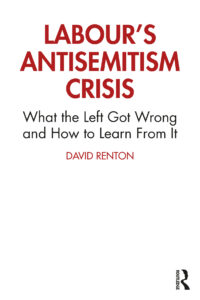Politics, Not Prosecution, Is the Answer to Antisemitism

 Nearly a year to the day before his untimely death, renowned anarchist anthropologist David Graeber wrote a provocative article which began, “I am 58 years old, and for the first time in my life, I am frightened to be Jewish.”
Nearly a year to the day before his untimely death, renowned anarchist anthropologist David Graeber wrote a provocative article which began, “I am 58 years old, and for the first time in my life, I am frightened to be Jewish.”
The global re-emergence of right-wing political antisemitism was of course part of the impetus for Graeber’s article; but ultimately, his concern was rooted in the United Kingdom and the repeated high-profile accusations of antisemitism within the Labour Party. Jews make up less than one half of one percent of the British population; but “between 15 June 2015 and 31 March 2019, the UK’s national press published five and a half thousand articles about antisemitism in the Labour Party,” and the Labour Party investigated more than 10,000 instances of allegedly antisemitic conduct, mostly following accusations from the Party’s anti-Corbynite right (Renton). Graeber’s article pleaded for caution: such a disproportionate, factional response to antisemitism could never be good for the Jews.
Two years later, Corbyn has been defeated, and British Jews have very little to show for it. Documents leaked last year show that right-wing members of the Labour Party bureaucracy had knowingly interfered with investigations of antisemitism in order to deepen the crisis facing the left-wing leadership. The handful of Party members who were expelled for antisemitic language under Corbyn have kept hold of substantial followings, with large sections of the Labour left — including the pro-Corbyn Jewish Voice for Labour — maintaining that the expulsions were evidence not of antisemitism, but of a right-wing, anti-Corbyn witchhunt. And all the while, Tory Prime Minister Boris Johnson, who publishes self-described “antisemites” and writes novels about powerful “Jewish oligarchs” and greedy, proud-nosed Jewish misers, has managed to seize the moral high ground on antisemitism in the media narrative. It is in this context of confusion and resolute defeat for both the organized left and the genuine struggle for Jewish liberation that David Renton’s new book attempts to excavate the ugly truth of the crisis: that “the campaign [against alleged Labour antisemitism] could not have lasted had it not been for the reality that the press, and Labour supporters, were repeatedly able to find instances of behaviour which was either antisemitic or within touching distance of it.” Renton enters a field of left-wing literature about the crisis which refuses on principle to take concerns about antisemitism seriously given that they mostly originated from the antisemitic right, and he takes a different tack. Renton writes, “There are many passages of this book where I criticise the right, the centre right, the leaders of mainstream Jewish institutions and the press…. But the focus of this book is ultimately on what the left got wrong.” His commitment to breaking down defensiveness and engaging with the political substance of the crisis, the hypocrisy of the right notwithstanding, is what makes his book special.
Renton’s work is equal parts autopsy and work of optimism. He convincingly diagnoses the failure of the left to identify and respond to antisemitism as a reliance on procedure to resolve an essentially political problem — namely, the widespread presence on the left of opinions ranging from the openly antisemitic to a casual disregard of Jewish opinion. As accusations of rampant antisemitism in the Labour Party proliferated, much of the left attempted to deflect from the issue with appeals to the old refrain that anti-Zionism is not antisemitism, even in cases where the conduct in question had absolutely nothing to do with Zionism. Such was the case when pro-Corbyn leftists defended the Labour leader from criticism during the scandal over his perfunctory support for a mural by Mear One that included antisemitic imagery. Corbyn’s defenders declared, “The Zionists are playing a dangerous game when they conflate anti-Zionism and condemnation of Israel with antisemitism.” Renton responds: “‘The Zionists’ – really? Because the subject of the mural was not Israel or Palestine. The image expressed old-style anti-Jewish racism.”
These sorts of deflections constituted part of the political problem that faced the left. The proceduralist response came when the left turned to legalistic disciplinary processes to insulate themselves. When, for example, Shami Chakrabarti was tasked in 2016 with investigating antisemitism within the Labour Party, her recommendations included statutes of limitations on investigations of uncomradely conduct and the creation of a standing panel of lawyers to assist with disciplinary decisions. Renton summarizes that the report fell “into the trap of thinking that the panels made bad decisions because they lacked technical expertise, when what they lacked was rather the political good sense to do right without deferring to factional interest.” The Chakrabarti report, like many good-faith attempts to right the Labour ship, could not fully grasp that the conflict had long ceased to be about uprooting antisemitism, and was instead infested with attempts to “weaponize antisemitism” for or against some factional interest. Despite the airtime that this phenomenon lent to the topic of anti-Jewish racism, as Graeber points out, it was a profoundly harmful trend toward the prospects of Jewish freedom from antisemitism.
Antisemitism need not, as Barnaby Raine argues, “always be a conscious hatred of the kind exhibited in Nazi propaganda.” It is “a structure of feeling,” “potentially subconscious,” “ideological.” By the time those on the Labour left were attempting to root out antisemites — or defend them, as the case may be — they were already operating within the bounds of antisemitic ideology. Thus, when Jeremy Corbyn, Ken Livingstone, and Jackie Walker each came under fire in turn for antisemitic comments, each was defended, in part, by emphasizing all of the other anti-racist actions they had taken. Naturally, this did little to sway Labour’s Jewish critics, who rightly countered that such deflections were themselves anti-Jewish. Furthermore, these accusations were dismissed as preposterous in the face of such blatant racism from the right — as though the political motivation behind certain accusations made them false a priori. It is no surprise, given that all three members were eventually suspended, that the weakest parts of their defenses were those dealing with the actual antisemitic comments themselves.
Ultimately, while Renton critiques Labour for responding to the crisis with defensiveness, the turn to legalistic prosecutions of antisemitism demonstrated precisely the political weakness that would yield slippages into antisemitism by otherwise anti-racist socialists. The Corbynites routinely conceived of the problem as one of aberrant, anachronistic bigotry, rather than pernicious ideology, and this meant that the left was remarkably ill-equipped to parse through subtler cases of potential slippage into antisemitism, or otherwise latent tendencies toward antisemitic thought. Renton recounts friends “who are finely attuned to other forms of discrimination, shar[ing] defences of antisemitic images which were themselves cut and pasted from [notable antisemite] David Icke’s website.” Such political transformations were possible because of a fundamental failure to take antisemitism seriously as an ideology rather than a set of anachronistic bigotries.
Early in the book, Renton examines a 2015 YouGov poll showing relatively even support for a number of antisemitic stances (between 10 and 20%) across party lines — except for UKIP voters, who were substantially more antisemitic. “Supporters of Corbyn’s leadership used such polls to prove that antisemitism went as deep in the Conservatives as it did in Labour,” Renton writes, “Yet what it really showed was that in Britain as a whole, antisemitic ideas were commonplace. If you were thinking of the Corbyn-era Labour Party, with its half a million members by summer 2016, there must have been tens of thousands of people holding these views.” Two things were always true: the right’s crusade against antisemitism within Labour was disingenuous, cynical, and anti-Jewish; and attempts to suggest that there was not an antisemitism problem in Labour were bound to fail under the weight of the absolute scope of anti-Jewish racism within the Party. Antisemitism did not need to be a problem particular to Corbyn’s Labour Party for it to constitute a genuine political problem for a movement seeking collective liberation. But proceduralist thinking and a knee-jerk self-assuredness in the face of the sheer unfairness of the campaign against Labour won out over the concrete political needs facing the socialist movement. For many of the Corbynites, hypocrisy was the real problem, not antisemitism; and this approach, unsurprisingly, failed to curry much favor among self-conscious Jews or their well-meaning, anti-racist allies.
Renton’s optimism emanates from his commitment that political problems have political solutions. While the book takes an expansive view of antisemitism with Renton suggesting to his readers that “wherever you locate yourself on the political spectrum, antisemitism is always closer at hand than you think,” it also rejects a fatalistic view: “the supply of antisemitic stories and stereotypes can at times be relatively full or relatively empty.” An empty “reservoir” of antisemitic discourses is possible.
It is optimistic, contra the embattled perspectives of much of Labour’s left, that the faltering of Jewish support for Labour is a reaction to Labour’s failures with respect to anti-Jewish racism, and not the inevitable consequence of a community assimilating into privilege. As Renton reminds us, Jews are a group that, “like every other ethnic group in Britain, includes any number of middle class as well as working class and vulnerable people.” This commonsense position, disturbingly rare in the left’s response to the crisis, is key for building a politics of genuine collective liberation inclusive of not only Jews, but all those who seek to fight with their Jewish neighbors against oppression.
And most importantly, Renton reframes the problem of exorcising antisemitism from the left as one of encouraging political growth and development — not simply rebuking and isolating offenders. Labour’s legalistic and defensive turn assumed that the Party’s programmatic anti-antisemitism was sufficient for inoculating itself against anti-Jewish racism — and that individual endorsements of antisemitic ideology constituted a moral failing of those individuals. But Renton asks what would have happened “if for example in 2012, when Corbyn expressed his initial cautious and questioning support for Mear One, his left-wing admirers had challenged him.” Could the crisis have been averted by a proactive, expansive political challenge to antisemitism when the first signs of its re-emergence started to surface? What political opportunities would open if, rather than a simple rebuke, those found to be practicing antisemitism within Labour were engaged politically?
Renton’s book doesn’t have all the answers. His at times rosy optimism that what Labourites like Livingstone and Walker needed was a comrade in their ear, and not a boot out the door, is more a philosophy of changing hearts and minds than a strategy. Still, it is a philosophy that is despairingly rare on a left that has responded to repeated calls for accountability, from #MeToo to efforts addressing racial harm in left-wing spaces, first and foremost with the same kind of legalism and defensiveness at play in the antisemitism crisis. Labour’s Antisemitism Crisis points activists in a new, transformative direction for the next struggle.
Jonah ben Avraham is a Columbus-based writer and activist. He is a participant in DSA Jews and a member of the Tempest Collective.